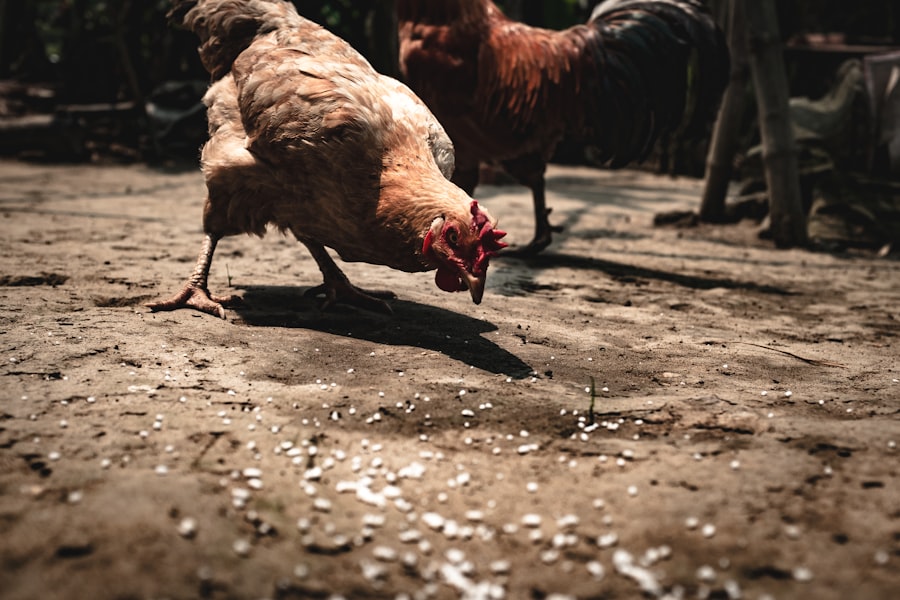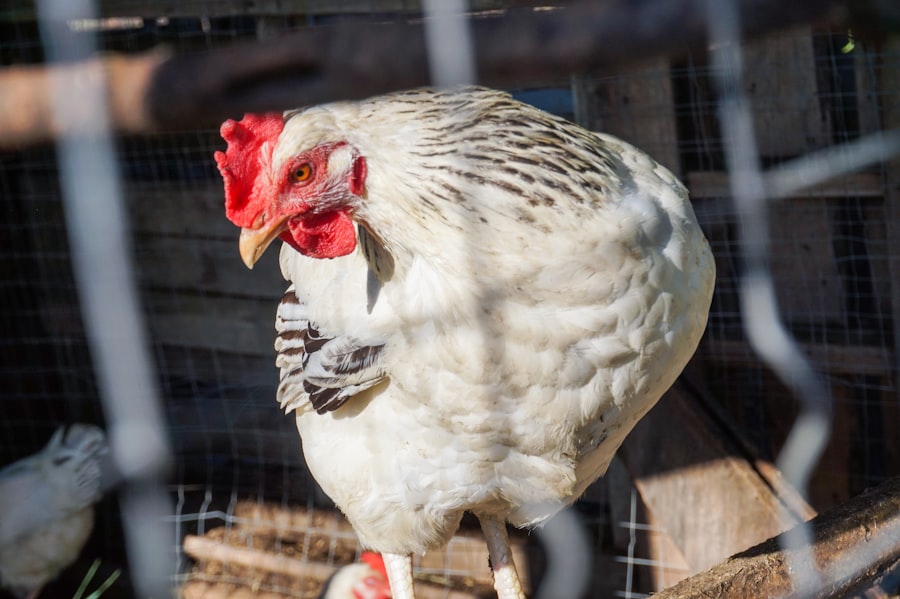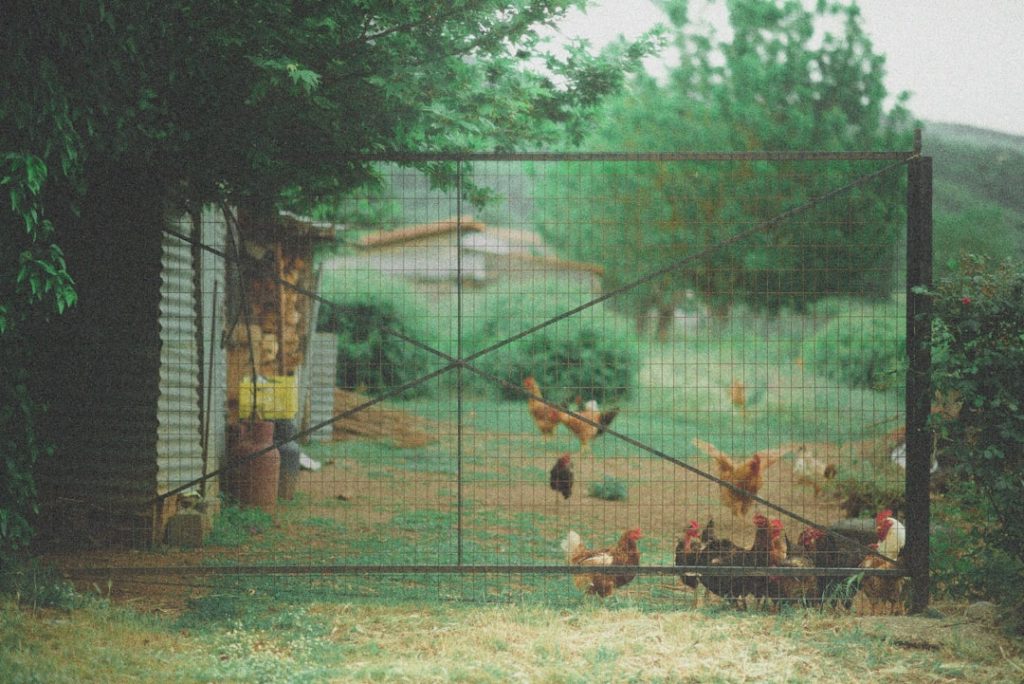Chickens are naturally curious and social animals that exhibit a wide range of behaviors. Understanding these behaviors is crucial for protecting them from predators, including cats. Chickens are territorial and will defend their space against intruders.
They are easily startled, which can make them vulnerable to attacks. Chickens have a natural instinct to roost at night, making them easy targets for nocturnal predators. Cats are natural hunters known for their agility and stealth.
They are territorial animals and may view chickens as potential prey or intruders. Cats are curious and may be attracted to the movement and sounds of chickens, increasing the likelihood of stalking and attacking them. Understanding the behavior of both chickens and cats is essential for developing effective strategies to protect chickens from cat attacks.
Table of Contents
- 1 Protecting Your Chickens
- 2 Deterrents for Cats
- 3 Creating a Safe Environment
- 4 Seeking Professional Help
- 5 Legal Options
- 6 Conclusion and Final Thoughts
- 7 FAQs
- 7.1 What are some ways to keep cats from eating my chickens?
- 7.2 Why do cats eat chickens?
- 7.3 Are there any natural predators of cats that can help protect my chickens?
- 7.4 What are some signs that cats are preying on my chickens?
- 7.5 Should I consider getting a guard dog to protect my chickens from cats?
Key Takeaways
- Chickens are naturally prey animals and may exhibit fearful or anxious behavior when threatened.
- Providing a secure coop and run, as well as supervision during free-range time, can help protect chickens from predators.
- Deterrents for cats, such as motion-activated sprinklers or ultrasonic devices, can help keep them away from the chicken coop.
- Creating a safe environment for chickens includes removing potential hiding spots for predators and securing fencing and coop structures.
- Seeking professional help from a veterinarian or animal behaviorist can provide valuable guidance in addressing predator-related issues.
- Legal options, such as local ordinances or regulations regarding predator control, should be considered when protecting chickens.
- Ultimately, understanding predator behavior, taking proactive measures, and seeking professional and legal assistance can help ensure the safety and well-being of chickens.
Protecting Your Chickens
Secure Coop and Run
One of the most effective ways to protect your chickens from cat attacks is to provide a secure coop and run. Make sure that the coop is sturdy and predator-proof, with no gaps or holes that cats can squeeze through.
Additional Safety Measures
Additionally, consider installing a wire mesh around the coop and run to prevent cats from gaining access. It’s also important to lock the coop at night to keep your chickens safe from nocturnal predators like cats.
Providing Hiding Spots and Deterrents
Another way to protect your chickens is to provide them with hiding spots and shelters within the coop and run. This will give them a safe place to retreat to if they feel threatened by a cat or other predator. You can also consider using motion-activated lights or sprinklers to deter cats from approaching the coop and run.
These measures can help create a safe environment for your chickens and reduce the risk of cat attacks.
Deterrents for Cats

There are several deterrents you can use to keep cats away from your chickens. One effective method is to use scent deterrents, such as citrus peels or coffee grounds, around the coop and run. Cats are known to dislike these scents and may be deterred from approaching the area.
You can also consider using ultrasonic devices that emit high-frequency sounds that are unpleasant to cats but are not audible to humans. Another effective deterrent is to use motion-activated devices that emit a burst of air or a loud noise when a cat approaches the coop and run. This can startle the cat and discourage it from coming back.
Additionally, you can use physical barriers such as fences or netting to prevent cats from gaining access to the coop and run. These deterrents can help keep cats away from your chickens and reduce the risk of attacks.
Creating a Safe Environment
Creating a safe environment for your chickens is essential in protecting them from cat attacks. Start by ensuring that the coop and run are secure and predator-proof, with no gaps or holes that cats can exploit. It’s also important to provide hiding spots and shelters within the coop and run where your chickens can retreat if they feel threatened by a cat.
Additionally, consider using motion-activated lights or sprinklers to deter cats from approaching the coop and run. You can also make the area around the coop and run less attractive to cats by removing potential hiding spots such as tall grass or dense vegetation. Keep the area clean and free of food scraps or spilled feed that may attract cats.
Providing your chickens with regular access to fresh water, food, and enrichment activities can also help reduce their stress levels and make them less vulnerable to cat attacks. By creating a safe and secure environment for your chickens, you can minimize the risk of cat attacks and ensure their well-being.
Seeking Professional Help
If you are struggling to protect your chickens from cat attacks, it may be helpful to seek professional help. Consider consulting with a veterinarian or animal behaviorist who can provide expert advice on how to deter cats and protect your chickens. They can help you understand the behavior of both chickens and cats and recommend effective strategies for keeping them safe.
You can also reach out to local animal control agencies or wildlife experts for assistance in dealing with cat predation on your chickens. They may be able to provide guidance on legal options for managing feral or stray cats in your area. Additionally, consider joining local poultry or farming groups where you can connect with other chicken owners who may have experience dealing with cat attacks and can offer valuable insights and support.
Legal Options

Understanding Local Laws and Regulations
In some cases, you may need to explore legal options to address cat predation on your chickens. If you are dealing with feral or stray cats that pose a threat to your chickens, it’s important to familiarize yourself with local laws and regulations regarding animal control and protection. Some areas have ordinances that address feral cat populations and provide guidelines for managing them.
You may also consider reaching out to local animal control agencies or wildlife authorities for assistance in addressing cat predation on your property. They may be able to provide guidance on trapping and relocating feral or stray cats, or they may have resources available for implementing humane deterrents to keep cats away from your chickens.
Humane Deterrents and Relocation Options
By working with local authorities, you can explore humane and effective ways to deter cats from your property and protect your chickens. This may include trapping and relocating feral or stray cats, as well as implementing deterrents such as fencing, repellents, or other measures to keep cats away.
Conclusion and Final Thoughts
Protecting your chickens from cat attacks requires a combination of understanding their behavior, implementing effective deterrents, creating a safe environment, seeking professional help, and exploring legal options when necessary. By taking proactive measures to secure the coop and run, provide hiding spots for your chickens, use scent deterrents and motion-activated devices, and seek expert advice when needed, you can minimize the risk of cat attacks and ensure the well-being of your flock. It’s important to remember that cats are natural hunters, and while it’s essential to protect your chickens, it’s also important to consider humane solutions for managing cat predation.
By working with local authorities and seeking guidance from professionals, you can find effective ways to coexist with cats while keeping your chickens safe. Ultimately, creating a safe and secure environment for your chickens is key in protecting them from cat attacks and ensuring their health and happiness.
If you’re struggling with keeping your chickens safe from predators like cats, you may want to consider investing in a secure chicken coop. Poultry Wizard offers a helpful article on the importance of a sturdy floor for your chicken coop, which can help keep out unwanted visitors like cats. Check out their tips for maintaining a safe and secure coop here.
FAQs
What are some ways to keep cats from eating my chickens?
There are several methods to deter cats from preying on chickens, including using motion-activated sprinklers, creating physical barriers such as fences or netting, and using scent deterrents like citrus or lavender.
Why do cats eat chickens?
Cats are natural hunters and may see chickens as prey. They may also be attracted to the movement and sounds of the chickens, making them a target for hunting.
Are there any natural predators of cats that can help protect my chickens?
Some natural predators of cats include larger birds of prey such as hawks and owls, as well as coyotes and foxes. However, it’s important to consider the potential impact on the local ecosystem before introducing additional predators.
What are some signs that cats are preying on my chickens?
Signs that cats are preying on chickens may include missing or injured chickens, as well as evidence of cat tracks or scat near the chicken coop or run.
Should I consider getting a guard dog to protect my chickens from cats?
Guard dogs can be effective at deterring predators, including cats, from preying on chickens. However, it’s important to properly train and socialize the dog to ensure it does not pose a threat to the chickens or other pets.
Meet Walter, the feathered-friend fanatic of Florida! Nestled in the sunshine state, Walter struts through life with his feathered companions, clucking his way to happiness. With a coop that’s fancier than a five-star hotel, he’s the Don Juan of the chicken world. When he’s not teaching his hens to do the cha-cha, you’ll find him in a heated debate with his prized rooster, Sir Clucks-a-Lot. Walter’s poultry passion is no yolk; he’s the sunny-side-up guy you never knew you needed in your flock of friends!







